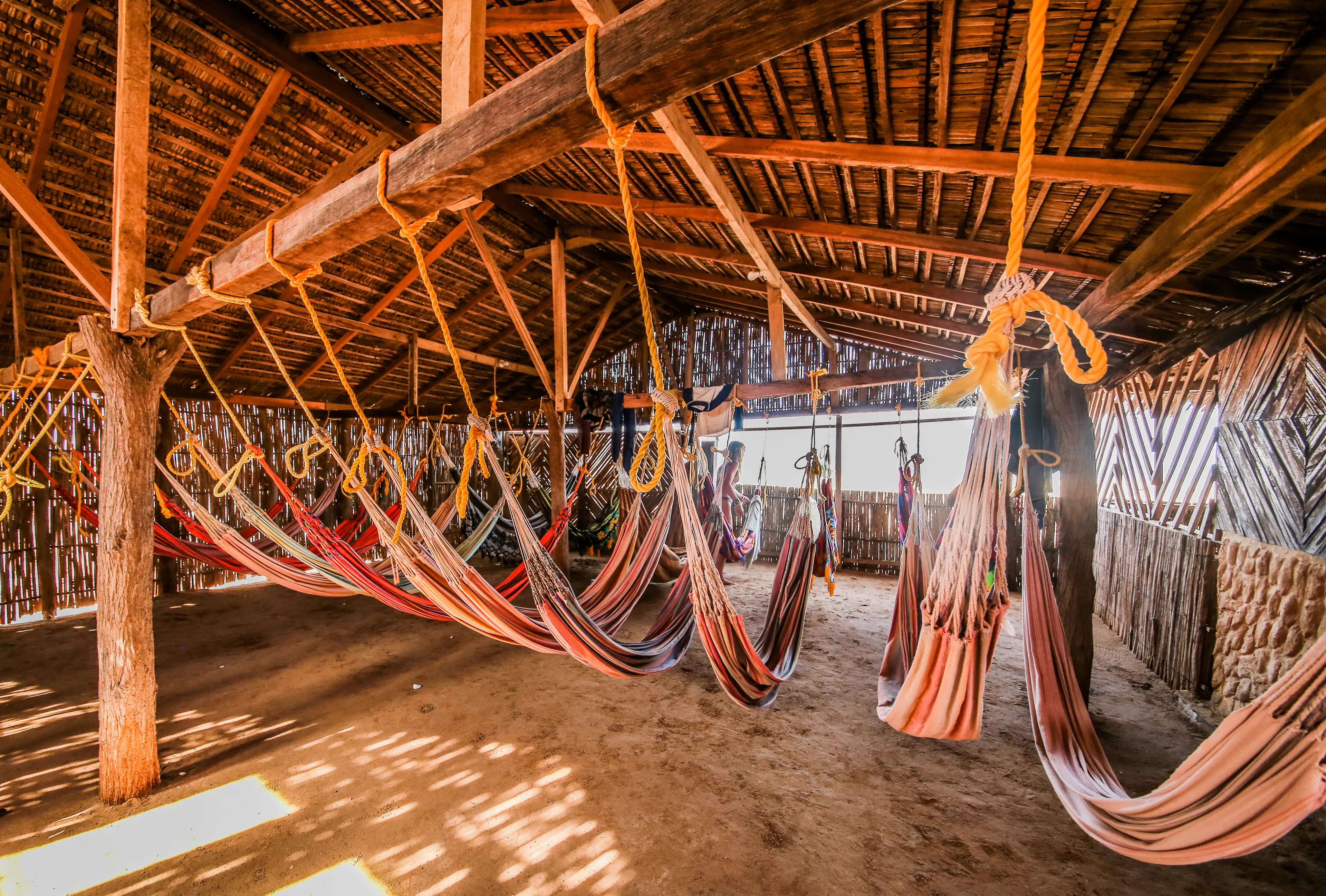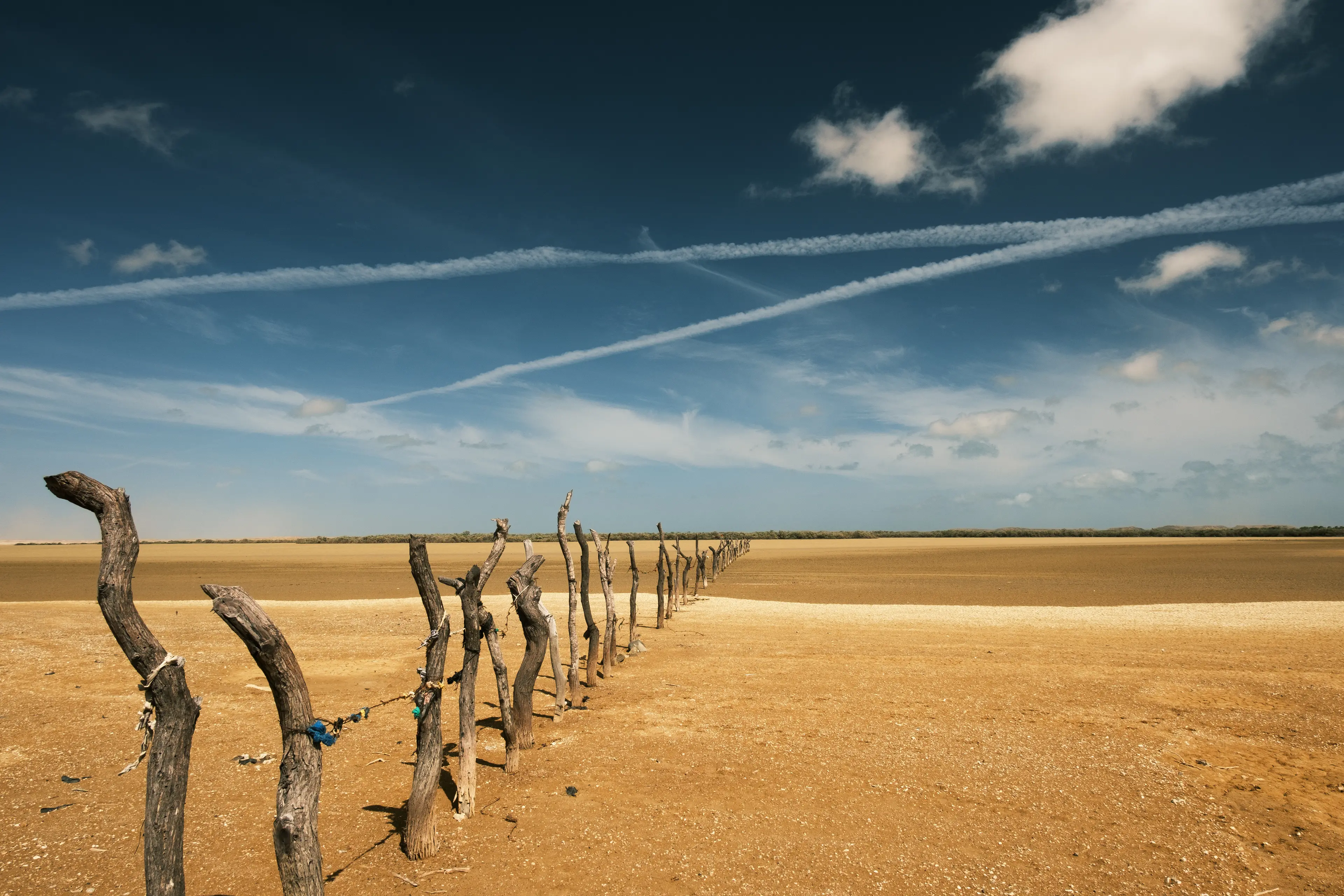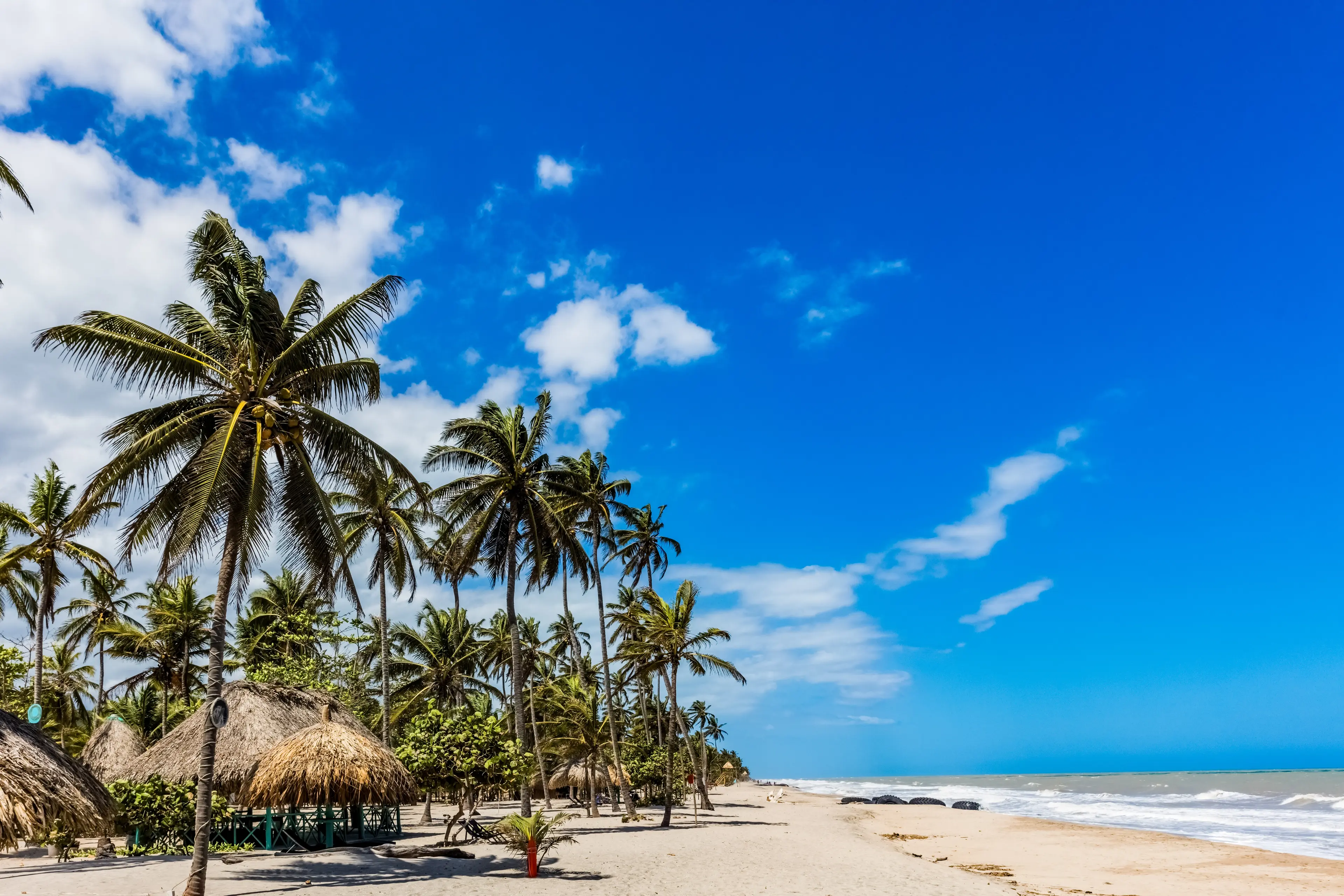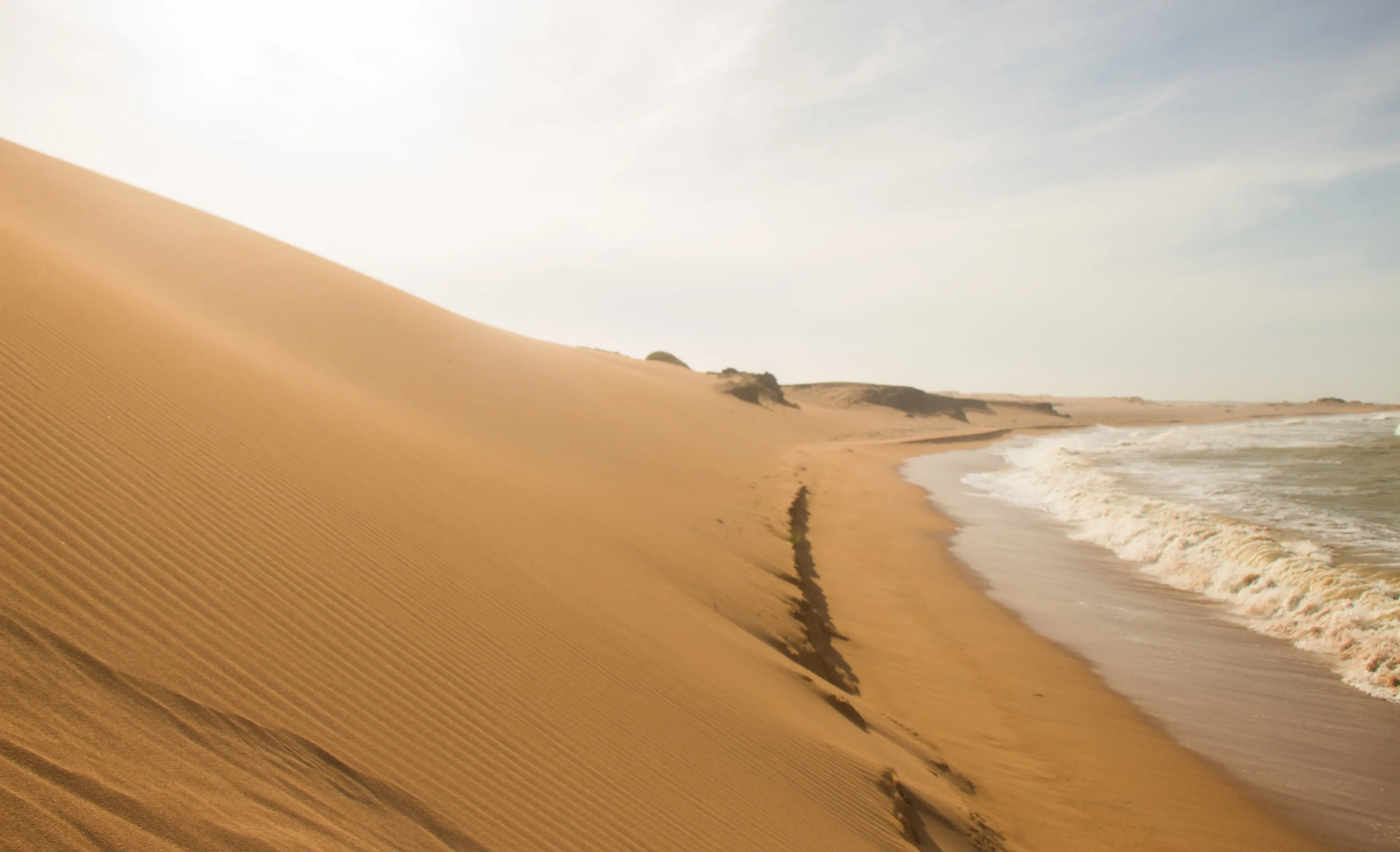3-Day Adventure & Sightseeing Itinerary in Unexplored La Guajira
La Guajira, Colombia
3 days





About La Guajira, Colombia
Discover the untouched beauty of La Guajira, Colombia, a hidden gem offering a unique blend of indigenous culture, stunning landscapes, and pristine beaches. Experience the vast desert of Cabo de la Vela, where sand dunes meet the Caribbean Sea, and visit the flamingo-filled sanctuary of Los Flamencos. Explore the Wayuu indigenous communities, known for their vibrant handicrafts and traditional music. Enjoy fresh seafood in the coastal town of Riohacha, and don't miss the breathtaking sunrise over Punta Gallinas, the northernmost point of South America. La Guajira is a destination for adventurous travelers seeking an off-the-beaten-path experience filled with natural wonders and rich cultural heritage.
3-Day Itinerary
Day 2
Visiting the Wayuu Indigenous Community and Pilon de Azucar
Morning
Start your second day with a visit to the Wayuu indigenous community. Learn about their culture, traditions, and way of life.
Lunch
Have lunch at a local restaurant, trying out the traditional Wayuu cuisine.
Afternoon
Post lunch, head to the Pilon de Azucar, a majestic hill offering panoramic views of the surrounding landscapes. Hike up the hill and enjoy the breathtaking views.
Dinner
Enjoy a traditional Colombian dinner at a local restaurant. Try the local delicacies like arepas and empanadas.
Evening
Spend the evening exploring the local markets, shopping for traditional Wayuu handicrafts and souvenirs.
Day 3
Exploring the Manaure Salt Flats and Los Flamencos Natural Park
Morning
On your final day, visit the Manaure Salt Flats. Witness the salt extraction process and explore the stunning white landscapes.
Lunch
Have lunch at a local eatery, enjoying the traditional Colombian cuisine.
Afternoon
Post lunch, head to the Los Flamencos Natural Park. Explore the diverse flora and fauna of the park and enjoy bird watching.
Dinner
Enjoy your last dinner in La Guajira at a local restaurant, trying out the local delicacies.
Evening
End your trip with a relaxing evening at the beach, reminiscing about the wonderful experiences of the past three days.
Attractions in Itinerary (6)

1Flamingo Sanctuary
A sanctuary dedicated to the preservation of flamingos and other local wildlife. Visitors can observe these beautiful creatures in their natural habitat.

2Cabo de la Vela
A remote desert beach known for its stunning landscapes and kitesurfing opportunities.

3Wayuu indigenous community
Experience the rich culture and traditions of the Wayuu indigenous community.

4Pilon de Azucar
A stunning hill with a panoramic view of the surrounding desert and sea.

5Manaure Salt Flats
A vast area of salt flats, where salt is still traditionally harvested.

6Los Flamencos Natural Park
A natural park that is home to a variety of wildlife, including flamingos. The park offers walking trails and bird watching opportunities.
Local Food and Drinks (12)
Chivo en Coco
A popular dish in La Guajira, Colombia, Chivo en Coco is a goat meat stew cooked in coconut milk, giving it a unique, rich flavor.

Arepa de Huevo
A traditional Colombian breakfast item, Arepa de Huevo is a deep-fried cornmeal dough filled with an egg. It's a common street food in La Guajira.

Arroz con Coco
Arroz con Coco is a sweet and savory side dish made from rice cooked in coconut milk. It's a staple in the coastal regions of Colombia, including La Guajira.
Guandú con Queso
Guandú con Queso is a traditional dish in La Guajira, made with pigeon peas and cheese. It's a hearty and comforting meal.

Pargo Rojo Frito
Pargo Rojo Frito is a popular dish in La Guajira, featuring fried red snapper served with coconut rice and plantains.

Carimañolas
Carimañolas are deep-fried yucca fritters filled with cheese or meat. They are a popular snack in La Guajira.
Chicha de Maíz
Chicha de Maíz is a traditional Colombian beverage made from fermented corn. It's a common drink in La Guajira.

Chicharrón de Pescado
Chicharrón de Pescado is a popular snack in La Guajira, made from deep-fried fish skin. It's crispy and flavorful.
Enyucado
Enyucado is a traditional dessert in La Guajira, made from yucca, cheese, and coconut. It's sweet and rich in flavor.

Limón Mandarino
Limón Mandarino is a refreshing beverage made from a local citrus fruit that's a cross between a lime and a mandarin. It's popular in La Guajira.

Chicha de Piña
Chicha de Piña is a traditional Colombian beverage made from fermented pineapple. It's a common drink in La Guajira.
Suero Atollabuey
Suero Atollabuey is a traditional condiment in La Guajira, made from fermented milk. It's often used as a dip for arepas or as a topping for various dishes.
Best time to visit
The best time to visit La Guajira, Colombia is during the dry season, which runs from December to March. During these months, you can expect less rainfall and more sunshine, making it ideal for exploring the beautiful beaches, desert landscapes, and indigenous Wayuu culture. The temperatures during this time are also more comfortable, typically ranging between 25°C and 35°C.
How to get around
Car Rental
Renting a car is a popular option for getting around La Guajira. It gives you the freedom to explore at your own pace. However, it's important to note that some areas of La Guajira have rough terrain, so a 4x4 vehicle is recommended.
Bus
There are several bus companies that operate in La Guajira, providing services between major towns and cities. Buses are a cost-effective way to travel, but they can be crowded and the journey times can be long.
Taxi
Taxis are readily available in the larger towns and cities of La Guajira. They are a convenient way to get around, especially if you're not comfortable driving in unfamiliar territory. Always negotiate the fare before getting in.
Motorcycle Taxi
Motorcycle taxis, or 'mototaxis', are a common form of transport in La Guajira. They are a quick and cheap way to get around, especially in traffic. However, they may not be the safest option, especially for long distances.
Ridesharing
Ridesharing services like Uber are available in some parts of La Guajira. They can be a convenient and cost-effective way to get around. However, availability can be limited in more remote areas.
Boat
Boat travel is an essential part of getting around in some coastal areas of La Guajira. It's a unique way to see the region's stunning coastline and visit remote beaches.
Bicycle
Cycling can be a great way to get around in La Guajira, especially in the more rural areas. It's environmentally friendly and gives you the opportunity to see the region at a slower pace. However, be prepared for hot weather and bring plenty of water.
Horseback
In some rural areas of La Guajira, horseback is still a common mode of transport. It's a unique and traditional way to explore the region, but it may not be suitable for everyone.
Foot
Walking is a viable option in the towns and cities of La Guajira. It's free, environmentally friendly, and allows you to take in the sights at your own pace. However, distances between attractions can be large, so it's not always the most practical option.
Important information
Currency$ COP
Time zoneUTC-5
Driving sideRight
Emergency phone119
Drinking waterOpt for bottled water
Power sockets
Voltage110 V
Things to know about La Guajira, Colombia as a first time visitor
1
La Guajira is located in the northernmost part of Colombia and South America.
2
The official language is Spanish, but the indigenous Wayuu language is also widely spoken.
3
The currency used is the Colombian Peso (COP). Credit cards are accepted in most places, but it's advisable to carry some cash for smaller establishments or remote areas.
4
La Guajira has a desert climate. It's hot during the day (around 90°F/32°C) and cooler at night (around 70°F/21°C).
5
It's advisable to wear light, breathable clothing due to the hot climate. Don't forget your hat, sunglasses, and sunscreen.
6
Tap water is not safe to drink. Always drink bottled water.
7
La Guajira is a remote area with limited medical facilities. It's advisable to have travel insurance that covers medical evacuation.
8
The region is home to the Wayuu people, an indigenous group. Respect their customs and traditions.
9
Public transportation is limited. Renting a car or hiring a driver is the best way to get around.
10
The region is generally safe, but like anywhere, it's important to take precautions. Avoid displaying expensive items and keep your belongings secure.
11
La Guajira is not a typical tourist destination. English is not widely spoken, so learning some basic Spanish phrases can be helpful.
12
The region is known for its beautiful handicrafts, particularly Wayuu bags. These make great souvenirs.
13
La Guajira is a great place for bird watching, with over 270 species recorded.
14
The region is famous for its music, particularly vallenato and cumbia. Don't miss the opportunity to experience a live performance.
15
The local cuisine is heavily based on seafood, goat meat, and indigenous fruits. Try the traditional dish 'Friche', a goat stew.
16
The region has limited internet and cell phone coverage, especially in remote areas.
17
The best time to visit is during the dry season, from December to April.
18
Always ask permission before taking photos of locals, especially the indigenous Wayuu people.
19
La Guajira operates on Colombia Time (COT), which is 5 hours behind Coordinated Universal Time (UTC-5).
20
Remember to respect the environment. The region is home to unique flora and fauna, and it's important to leave no trace.
Basic Spanish to know as a first time visitor
English phrase | Native phrase | Pronunciation | When to use it |
|---|---|---|---|
Hello | Hola | O-la | Greeting someone |
Goodbye | Adiós | A-dee-os | Leaving someone |
Please | Por favor | Por fa-vor | Making a request |
Thank you | Gracias | Gra-see-as | Expressing gratitude |
Yes | Sí | See | Agreeing with someone |
No | No | No | Disagreeing with someone |
Excuse me | Perdón | Per-don | Getting someone's attention |
I'm sorry | Lo siento | Lo see-en-to | Apologizing |
Do you speak English? | ¿Hablas inglés? | Ha-blas in-gles | Asking if someone speaks English |
I don't understand | No entiendo | No en-tee-en-do | When you don't understand what is being said |
Where is the bathroom? | ¿Dónde está el baño? | Don-de es-ta el ban-yo | Asking for the bathroom |
How much does this cost? | ¿Cuánto cuesta esto? | Kwan-to kwes-ta es-to | Asking the price of something |
I would like... | Me gustaría... | Me gus-ta-ree-a | Expressing a desire for something |
Help! | ¡Ayuda! | A-yu-da | In case of emergency |
Can I have the menu, please? | ¿Puedo tener el menú, por favor? | Pwe-do te-ner el me-nu, por fa-vor | At a restaurant |
Water | Agua | A-gwa | Asking for water |
Beer | Cerveza | Ser-ve-za | Ordering a beer |
Cheers! | ¡Salud! | Sa-lud | Making a toast |
Where is...? | ¿Dónde está...? | Don-de es-ta | Asking for directions |
Good night | Buenas noches | Bwe-nas no-ches | Saying goodnight |
Packing List
Clothing
Lightweight clothing
Swimwear
Sunglasses
Hat for sun protection
Comfortable walking shoes
Flip flops for the beach
Light jacket or sweater for cooler evenings
Toiletries
Travel-sized shampoo and conditioner
Travel-sized body wash
Toothbrush and toothpaste
Deodorant
Sunscreen
Insect repellent
Personal hygiene items
Prescription medications
First aid kit
Travel documents and essentials
Passport
Driver's license or ID card
Credit and debit cards
Cash in local currency
Travel insurance documents
Hotel and transportation reservation confirmations
Emergency contact information
Electronics and gadgets
Smartphone
Charger for smartphone
Power bank
Camera
Memory cards for camera
Universal travel adapter
Miscellaneous items
Travel pillow
Earplugs and eye mask
Snacks
Reusable water bottle
Books or e-reader for entertainment
Travel guidebook for La Guajira
Spanish-English dictionary or phrasebook
Weather Conditions
When planning a trip to La Guajira, Colombia, it's important to consider the region's weather patterns to ensure a comfortable and enjoyable visit. La Guajira is a desert region, so it experiences a hot and dry climate throughout the year. Temperatures in La Guajira can range from 80°F to 95°F (27°C to 35°C) during the day, dropping to around 70°F (21°C) at night. It's advisable to pack lightweight, breathable clothing to stay comfortable in the heat. Don't forget your sunscreen, hat, and sunglasses to protect yourself from the strong sun. The region experiences two main seasons: a dry season from December to April and a wet season from May to November. If you prefer to avoid the rain, plan your visit during the dry season. However, the wet season can also be a great time to visit as the rain can bring a refreshing change to the hot and dry climate, and the landscape becomes more lush and green. Despite being a desert, La Guajira can experience occasional heavy rainfall, especially during the wet season. It's a good idea to check the weather forecast regularly during your visit and plan your activities accordingly. If you're planning to explore the desert areas, be aware that flash floods can occur after heavy rain. Lastly, keep in mind that La Guajira is a coastal region, so it can be windy at times, especially near the coast. If you're planning to spend time on the beach or go sailing, check the wind conditions to ensure it's safe. In conclusion, while La Guajira's weather can be hot and dry, with the right preparation, it can be a unique and enjoyable destination to visit.
| Month | Hi / Lo (°C) | Weather Overview |
|---|---|---|
January | 34° / 24° | January is the start of the dry season in La Guajira, with warm temperatures and little rainfall. It's a great time for beach activities and exploring the desert. |
February | 34° / 24° | February continues the dry season with warm, sunny days. It's an excellent time for outdoor activities and wildlife viewing. |
March | 35° / 25° | March is the hottest month in La Guajira, with temperatures often reaching 35°C. It's a perfect time for sunbathing and enjoying the beautiful beaches. |
April | 36° / 26° | April sees the end of the dry season, with temperatures slightly rising. It's a good time to visit if you enjoy hot weather and want to avoid the crowds. |
May | 37° / 27° | May marks the start of the rainy season in La Guajira. Despite the rain, the temperatures remain high, making it a good time for indoor activities and cultural exploration. |
June | 37° / 27° | June continues the rainy season, with high humidity and frequent showers. However, the rain brings a unique beauty to the landscape, making it a great time for photography. |
July | 36° / 26° | July is a transitional month in La Guajira, with the rainy season ending and the dry season beginning. It's a good time to visit for those who prefer less rain and slightly cooler temperatures. |
August | 35° / 25° | August marks the return of the dry season, with less rainfall and warm temperatures. It's a great time for outdoor activities and exploring the natural beauty of La Guajira. |
September | 34° / 24° | September is a pleasant month in La Guajira, with moderate temperatures and little rainfall. It's an excellent time for beach activities and desert exploration. |
October | 34° / 24° | October continues the dry season, with warm days and cool nights. It's a good time to visit for those who prefer less crowded tourist spots. |
November | 34° / 24° | November is a great time to visit La Guajira, with warm temperatures and little rainfall. It's a perfect time for outdoor activities and exploring the local culture. |
December | 34° / 24° | December is a popular month for tourism in La Guajira, with warm weather and festive celebrations. It's a great time to experience the local culture and enjoy the beautiful beaches. |
Did you know?
Places near by La Guajira, Colombia

Santa Marta
Known for its beautiful beaches and the stunning Sierra Nevada mountains.

Riohacha
Capital city of La Guajira with beautiful beaches and a vibrant Wayuu culture.

Valledupar
Famous for its Vallenato music, a traditional Colombian music genre.

Cartagena
Historic city with colonial architecture, beautiful beaches, and a vibrant nightlife.

Barranquilla
Known for its Carnival, one of the biggest carnivals in the world.

Maracaibo
One of the largest cities in Venezuela, known for its oil industry and Lake Maracaibo.

Medellin
Known as the 'City of Eternal Spring' for its pleasant weather, and for its modern metro system, botanical gardens, and museums.

Bogota
The capital city of Colombia, known for its rich history, culture, and nightlife.

